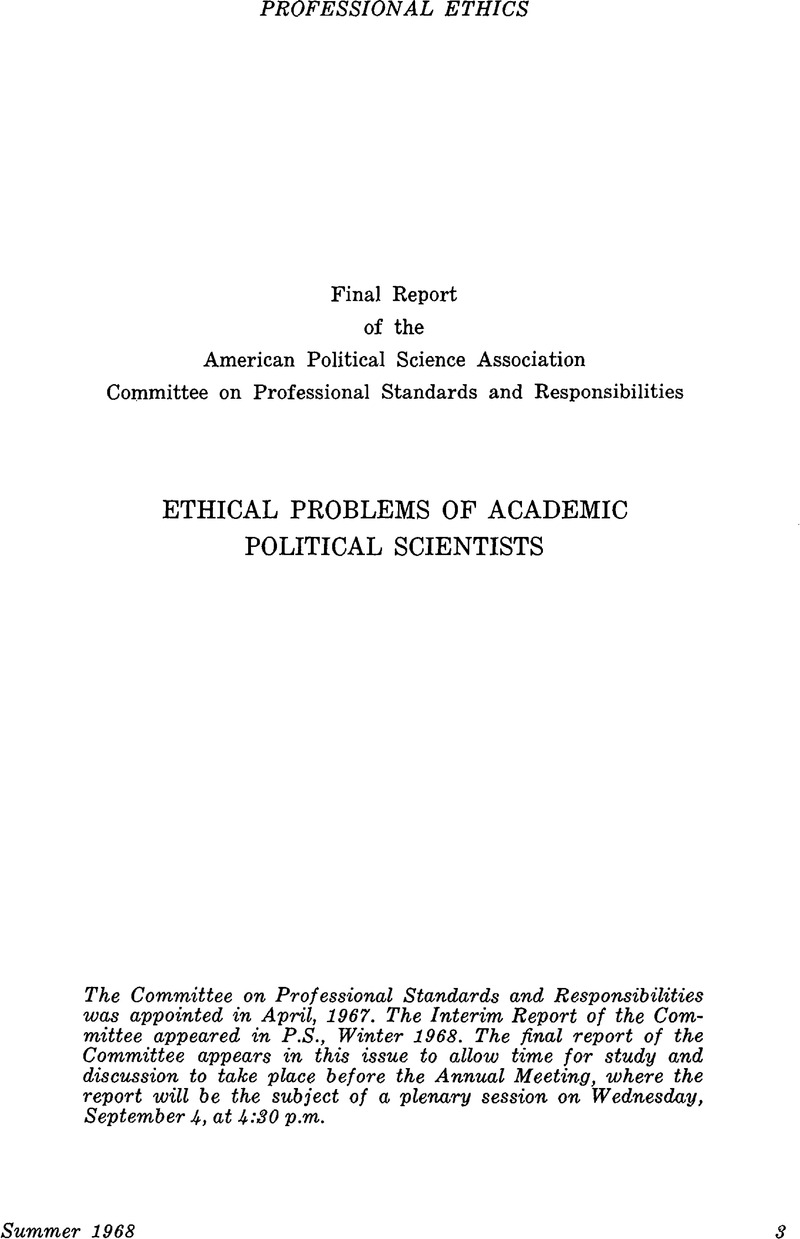No CrossRef data available.
Published online by Cambridge University Press: 28 November 2022

1 After receiving the report of the ad hoc Committee, President Dahl and the Executive Committee mailed a statement on the matter to all members of the Association (Printed in the APSR Vol. 81, June 1967, pp. 565–568 Google Scholar). The statement of the Executive Committee concluded that “upon full inquiry and reflection” the Executive Committee “accepts and confirms the findings of the ad hoc Committee” that the Executive Director and Treasurer had “violated no policy of the Association,” and were “involved in no conflict with their responsibilities to the APSA.” The statement then expressed the “highest confidence in the conduct and motives” of the two officers. The members of the ad hoc Committee were: Gabriel A. Almond, R. Taylor Cole, David B. Truman, and C. Herman Pritchett, Chairman. The members of the Executive Committee were: President Robert A. Dahl, Merle Fainsod, Harry Eckstein, Heinz Eulau, Austin Ranney, and Clinton Rossiter.
2 In September 1967, the Association adopted the following two proposals set forth in the Interim Report:
4. For the education of the profession, the Committee recommends that the Executive Director be asked by the Executive Committee to formulate and set in motion a program to encourage more sensitive awareness by members of the Association of ethical problems. Consideration should be (riven to various devices, such as the organization of special panels on professional ethics at national and regional meetings of political scientists; the encouragement of the publication of articles on ethical and other professional problems of the profession, as described in the Interim Report, in the Review and in other political science journals, the discussion of such problems in an Association newsletter, and the preparation of case studies involving ethical questions, published and distributed in a manner to be determined later.
5. The Executive Director of the Association should continue his special efforts to establish and maintain close, fruitful liaison with other professional associations active in the field of professional standards and ethical conduct and to seek to coordinate the efforts of the Association with the activities of other groups by giving timely notice of developments to the Association's members through various forms of publication and in other appropriate ways.
3 Shils, Edward A., “Social Inquiry and the Autonomy of the Individual,” in Lerner, Daniel, ed., The Human Meaning of the Social Sciences (New York: Meridian Books, 1959), pp. 114–57Google Scholar.
4 Ruebhausen, Oscar M. and Brim, Jr., Orville, G., “Privacy and Behavioral Research,” Columbia Law Review, November 1965, pp. 1184–1211 Google Scholar.
5 Some of the material in this section has been adapted from a report on “Freedom and Integrity of Overseas Research,” adopted by the Faculty of Princeton University in May 1968.
6 U. S. Congress, House, Committee on Government Operations, Administration of Grants by the National Institutes of Health, Report of the Intergovernmental Relations Subcommittee, 87th Congress, 2d Session, 1962. p. 15 Google Scholar.
7 National Academy of Sciences, Committee on Science and Public Policy, Federal Support of Basic Research in Institutions of Higher Learning, 1965 Google Scholar.
8 (See, e.g., U. S. Congress, House, House Committee on Government Operations, Health Research and Training: The Administration of Grants and Awards by the National Institutes of Health, Report of the Intergovernmental Relations Subcommittee, 87th Congress, 1st Session, 1961 Google Scholar; The Administration of Grants by the National Institutes of Health, Hearings before the Intergovernmental Relations Subcommittee, 87th Congress, 2nd Session, 1962; The Administration of Research Grants in the Public Health Service, Report of the Intergovernmental Relations Subcommittee, 90th Congress, 1st Session, 1967; National Academy of Sciences, Committee on Science and Public Policy, Federal Support of Basic Research in Institutions of Higher Learning, 1965 Google Scholar; Biomedical Science and Its Administration, Report to the President by the Office of Science and Technology, 1965; U. S. Bureau of the Budget, The Administration of Government Supported Research at Universities, 1966 Google Scholar.)
9 (See e.g., U. S. Congress, House, Committee on Appropriations, Hearings on Independent Offices Appropriations for 1967, 89th Congress, 2nd Session, 1966, pp. 144–45Google Scholar; Greenberg, D. S., “NSF; Senator Warns Against Budget Lobbying,” Science, Vol. 169, No. 3827 (May 8, 1968), p. 518 CrossRefGoogle Scholar, which inter alia reports sharp criticism of NSF support of political science research projects by Senator Warren G. Magnuson, Chairman, Senate Independent Offices Appropriations Subcommittee. See also Carroll, James D., “The Support of Political Science Research Projects by the Division of Social Sciences of the National Science Foundation, U. S. Congress, House, Committee on Government Operations,” The Use of Sosial Research in Federal Domestic Programs, 90th Congress, 1st Session, 1967, Vol. IV (pp. 81–105)Google Scholar.
10 This is identical with Al of the Guidelines for Research Contract Relations between Government and University as printed below.
11 As stated in the report of the committee chaired by Under Secretary of State Katzenbach which was accepted by the President on March 29, 1967. See The Department of State Bulletin, April 24, 1967, p. 665 Google Scholar.
12 These data are drawn from Somit, Albert and Tanenhaus, Joseph, The Development of American Political Science (Boston, 1967)Google Scholar, chap. 11: American Universities and Colleges, Cartter, Allen M., ed. (Washington, 1964)Google Scholar; and the Report of the Executive Director 1966-67, American Political Science Association.